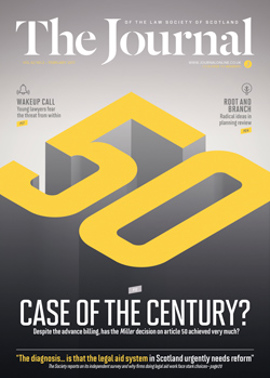Opinion: Callum Sinclair

Artificial intelligence seems to be everywhere now. My phone is “intelligent”, my television is “intelligent” and pretty soon I expect my shoes will warn me if my laces become untied. The legal sector is not exempt from this drive towards AI. But is the revolution really coming to an office near you? What can we expect it actually to do for our firms, large and small? And should we be nervous about our future?
Despite some eyecatching headlines, I’ve long considered that true AI is not what we’re seeing in the legal sector, or not yet. The most impressive and disruptive software is still focused on streamlining labour-intensive process, not replacing our valued experience and reasoning. Real value is not added by legal advisers combing through lengthy documents, but through the expertise applied in digesting what it all means, and ultimately the high-quality advice necessary for the best informed decisions. The “grind” that may be necessary to get to that point is where so-called AI systems in law are finding traction.
I’ve enjoyed hands-on demonstrations of several leading AI products. All were impressive in their own way, and no doubt strong business cases can be made for many. For example, the ability to have software do the first read of a large volume of similar documents (such as a package of leases) and report on patterns or inconsistencies could save hours of fee-earner time. Similarly, the ability to recognise exceptions to pre-taught rules – the idea of reporting by exception, a powerful tool in its own right. If you only had the time (or budget) for a limited review of a transaction package, wouldn’t your client benefit immensely from having an AI solution sift the unusual from the mundane for closer inspection? It’s certainly appealing.
But there are issues. Although many such solutions are cloud-based “pay as you use”, the implementation costs, for most firms and transactions, can be prohibitive (though will no doubt come down).
More fundamentally, these solutions are not true artificial intelligence. That would require the software to make decisions autonomously, based on information obtained (think headline cliché “robo-lawyers”). Even so-called cognitive solutions (those that “learn”), such as IBM Watson-based ROSS in the US, don’t do that. Nor should they. A commercial lawyer’s true value to their client lies in a clear understanding of that client’s business needs, and their ability to consider all the pertinent information (including “human” context) and provide well-reasoned, adaptable advice. Good lawyers need to be creative, as well as technically accurate. Finding the problem is one thing; finding the solution is quite another.
“Finding the problem” is currently where machines can really shine. Spot the odd one out, or the differences. Human beings are inherently bad at consistency in repetitive tasks. I once heard a colleague refer to working in commercial law as “a bit like trying to spot the Smartie in an M&M factory”. A machine, or more accurately an AI, can excel at this part of the job. Increasingly, however, machines will become a valuable tool in facilitating lawyers finding answers more speedily and accurately – for example, returning results from searches of unstructured datasets based on parameters provided by humans and filtering previous search attempts to influence future results.
So how can we prepare for the future? Fundamentally it’s about being your own strongest critic. Genuine analysis of your matters and how you spend your working day. How much of your time is spent actually engaging your knowledge and expertise, and how much going through the grind necessary to get there? Think about what systems could do to cut through the most time consuming parts of your service, letting you spend more time doing what matters most to your clients. Any time you see a repetitive or low complexity, high volume task, ask yourself whether systems could do this better. Then work with your colleagues and IT staff on solutions to help you work smarter. The right answers will vary with your firm size and setup, but are almost certainly not what you are doing now. And be adaptable and open to more collaboration with systems to do your daily work.
Ultimately, legal AI is not coming for your job. Provided you embrace it, it’s coming to make your job more efficient. And I for one am very excited to see how our profession transforms in response.
In this issue
- Miller, Brexit and BreUK-up
- Power to the people?
- Prerogatives, Parliament and the constitution: plus ça change?
- Decisions in high places
- Reading for pleasure
- Journal magazine index 2016
- Opinion: Callum Sinclair
- Book reviews
- Profile
- President's column
- Have you heard of ScotLIS?
- People on the move
- Article 50: the final say
- Where courts fear to tread
- "Wake up": how young lawyers see the future
- How healthy is our legal aid system?
- Challenging assumptions
- Planning to deliver
- Contact and the fear factor
- And the bill goes to...?
- Pakistan to join Child Abduction Convention
- Dress to impress?
- Handcuffing of prisoners and article 3
- Turning up the heat on workplace change
- Scottish Solicitors' Discipline Tribunal
- Not just for the green welly brigade
- Five by five
- Law reform roundup
- Relief over pensions and bankruptcy ruling
- Helpline plus
- Spill the beans on legal aid fraud
- The art of bringing the good news
- Cybercrime: how are you protected?
- Ask Ash
- One year rule becomes three
- From the Brussels office






